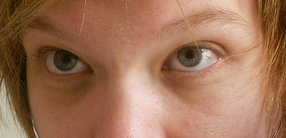Periorbital dark circles
| Periorbital dark circles | |
|---|---|
 |
|
| Minor dark circles and a hint of periorbital puffiness—a combination principally suggestive of minor sleep deprivation. | |
| Classification and external resources | |
| Specialty | Sleep medicine |
Periorbital dark circles (also known as dark circles) are dark blemishes around the eyes. There are many causes of this symptom, including heredity and bruising.
Any condition that causes the eyes to itch can contribute to darker circles due to rubbing or scratching the skin around them. Hay fever sufferers in particular will notice under-eye "smudges" during the height of the allergy season. Some food allergies can also cause the area under the eyes to appear darker.
Any medications that cause blood vessels to dilate can cause circles under the eyes to darken. Because the skin under the eyes is very delicate, any increased blood flow shows through the skin.
The lack of nutrients in the diet, or the lack of a balanced diet, can contribute to the discoloration of the area under the eyes. It is believed that iron deficiency can cause dark circles as well. Iron deficiency is the most common type of anemia and this condition is a sign that not enough oxygen is getting to the body tissues.
The skin can also become more pale during pregnancy and menstruation (due to lack of iron), allowing the underlying veins under the eyes to become more visible.
A lack of sleep can cause paleness of the skin, allowing the blood underneath the skin to become more visible and appear more blue or darker.
Dark circles are likely to become more noticeable and permanent with age. This is because as people get older, their skin loses collagen, becoming thinner and more translucent. Circles may also gradually begin to appear darker in one eye than the other as a result of some habitual facial expressions, such as an uneven smile.
Periorbital hyperpigmentation is the official name for when there is more melanin produced around the eyes than is usual, giving them a darker color.
Hydroquinone solution was often mixed in an oil-free moisturizer that acted like a skin bleach. However the use of hydroquinone for skin whitening has been banned in European Countries due to health concerns. In 2006, the United States Food and Drug Administration revoked its approval of hydroquinone for over the counter preparations warning that it may cause cancer or have many other detrimental effects.
...
Wikipedia
